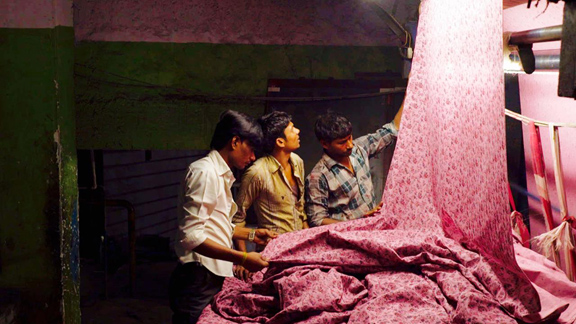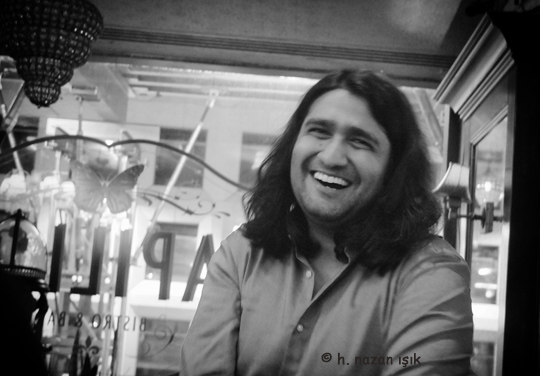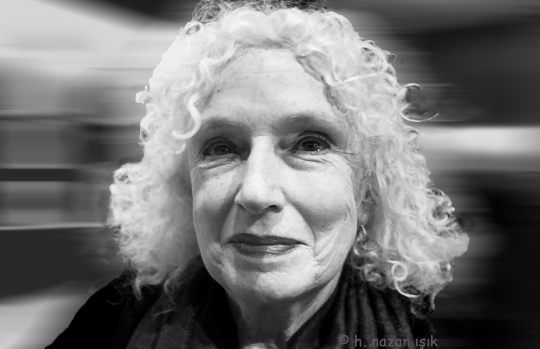h. nazan ışık—
17 February 2017—
Doc Fortnight, MoMA’s annual international nonfiction film festival, runs from 16 February to 26 February, brings recent films by emerging and established artists to New York audience. This year’s festival is celebrating its 16th year with an international selection of 20 features and more than 10 short films.
Doc Fortnight opened with the New York premiere of Rahul Jain’s debut feature, “Machines” (2016), which examines the physical labor and hardship in a textile factory in Gujarat, India, and presents an intimate portrayal of life and work in the factory.
A scene from “Machines”
Life in this factory is very difficult for the workers; they work 12 hours a day without protective masks, in dust, in dark place, with and in chemicals, with their hands for a little money. It is the pre-industrial working conditions.
Machines are still operated by workers, and some of them are just children.
“The entire task these people are doing can be programmed into a robotic machines already, but human beings are cheaper, human labor is very cheap to afford comparison with machine labor,” explains director Rahul Jain.
Rahul Jain says: “ I had to make something for my midterm project, I had nothing in my mind. My professor said “young should make work what they know.” This is something I knew. When I was very young my maternal grandfather had owned a textile factory, and every summer I used to go there and I was allowed to observe. So this is something I knew, I went back.”
Director Rahul Jain at the opening night reception.
Though Rahul Jain shows working conditions in only one factory in his film “Machines”, he says:” This is just one of the 800 factories in the industrial complex in 3 kilometer, and it represents them. There are more than a million workers who work nonstop. They work with their hands, only with their hands ”
He was kind enough to answer my questions.
H. Nazan Işık: It looks like you were granted all-access privileges, including intimacy, trust and interviewing the owner of the factory, how did you get it?
Rahul Jain: Well, the owner is a distant relative. With workers, it took me sometime to get the intimacy and trust. If you want intimacy from someone, you have to give it back. I was open to them. There is no contract, there is no paid-leave, if you leave for a break, someone else will get your job. And workers who talked openly about working conditions, hours and wages in the movie, were planning to leave and go to another factory to work.”
HNI: You stayed on one child who looked very tired, very sleepy, trying to keep his almost closed eyes open, working whit his hand, operating a machine. It was a long scene…and you cut to a different scene. It was a mixed message for me: Either he got hurt, you didn’t want to show it, or nothing happened, no one gets hurt in the factory. How did you want that scene to be read?
RJ: Yes, It was a long scene! Actually I stayed with him more than 30 minutes. We had 600 hours of materials; you saw only 70 minutes of it. Well, there were some accidents, but I didn’t want to show it….
HNI: But you could have showed it without showing the actual accident or blood by editing…
RJ: Yes, but……
HNI: A worker whom you interviewed asked you a question about your intention, what you were going to do with your film. Then you simply cut to the next scene without answering.
RJ: Because I didn’t have any answer. I was silent.
I had a chance to ask Kathy Brew, Guest Curator, why “Machines” was selected as Doc Fortnight Festival opening movie.
Guest curator Kathy Brew
Kathy Brew: I thought it was incredibly powerful, and beautiful, and aesthetic, but also raising issues about labor, climate change, and I think it was exquisite. I saw it in Amsterdam at IDFA (International Documentary Filmfestival Amsterdam). It was one of the two films we selected for Doc Fortnight. The other one is “Plastic China”.
Yes, she was right. It was beautiful, and aesthetic, and exquisite. Every scene was shot beautifully. Yes, it did touch issues about labor, and climate change. But it was very repetitive. Could have been a very powerful short film.
Organized by Kathy Brew, Guest Curator, with David Neary, Festival Manager.
Photos: © h. nazan ışık/ NKENdiKEN
© h. nazan ışık



